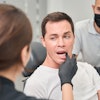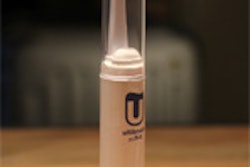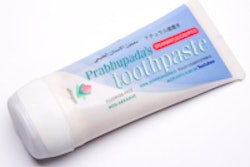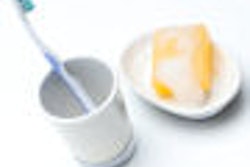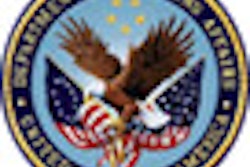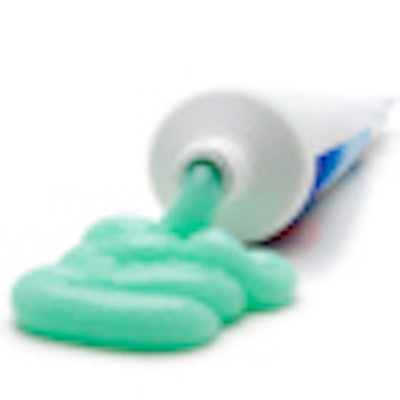
The dentifrice delivery system has changed little since the first tube of toothpaste was filled more than 100 years ago. But that could change with the introduction of chewable toothpaste tablets, which are less messy and more environmentally friendly.
The tablets offer a "laundry list" of advantages over a tube delivery system, according to Scott Jacobs, president of Archtek and creator of the Toothpaste Tablet.
“I'm dumbfounded that after 140 years we're still dealing with the same delivery system.”
— Scott Jacobs, Artchtek president
"The first is sanitation because you're not swiping the tube against a used brush, which transfers all the microbes from the brush onto the end of the tube," he said. "There's an environmental advantage because the product comes in a recyclable container. None of the toothpaste tubes on the market can be recycled, and there's about 560 million per year in the U.S. alone that end up in landfills."
The tablets, which come in 60-tablet bottles or boxes of 100 individually wrapped doses, are also tidy. "I have two boys, so I've lived with the mess toothpaste makes," Jacobs laughed. "You've got goo on the sinks, the counter, the floor, inside the drawers. ..."
Traversing Transportation Security Administration checkpoints at airports with the toothpaste tablets is easier than with traditional tubes since the dry tablets are not subject to the 3 oz. liquid limit guidelines for carry-on items.
"I'm dumbfounded that after 140 years we're still dealing with the same delivery system," Jacobs said. "So many advances have been made in other areas toward mobility, sanitation, and lessening environmental impact."
The tablets contain cranberry extract (Exocyan), which reduces plaque, and xylitol to help mitigate the formation of caries. Two clinical studies, which are scheduled to be finished in June, are being performed at two different universities that Jacobs hopes will provide enough data for approval. He declined to name them until the studies are completed.
A clinical study conducted by Archtek provided enough evidence for the Dental Advisor to award it the Top Innovative Consumer Product of 2011 in January, according to Jacobs. The tablets received an 86% clinical rating from the Dental Advisor reviewers, with 57% saying they would recommend the product and 29% saying they would switch from a paste to the tablet.
8 years in the making
Jacobs first had the idea for a tablet-delivered dentifrice about eight years ago.
"I tried to introduce an effervescent tablet that created an amazing foaming action as soon as you put it in your mouth without ever needing a brush, but there were stability issues and expense-related ones," he said.
The idea for a tablet stuck, however. "The more I thought about a tablet-based delivery system, the more the advantages became apparent," he added.
Creating a cost-comparable product with similar dosing were two primary obstacles. The first aspect was overcome during research and development. Sorting out the matter of dosing and public perception will take more time.
"People often ask me, 'How many uses do I get out of a tube of paste?' " Jacobs said. "The recommended dose is somewhere around 12 brushings per ounce. But because there's never been anything different in the marketplace, the thought process of the public is, 'How do I compare a 60-tablet bottle to a tube of paste. Is it equal to one? Two?' They flat out don't know."
Jacobs referenced a recent Wall Street Journal article that reported the existence of more than 350 varieties of toothpaste. "It's tough for the consumer to perceive the nuances between them," he said.
Archtek, which was started in the 1960s by Jacobs's father after he invented the boiling water mouthguard, is hoping to gain the ADA seal of approval for the tablets. Jacobs is also working to add the tablets to consumer store shelves; the Wal-Mart travel section will begin carrying the product in June. Archtek has also had a presence at dental and travel goods conventions while courting organizations such as Cardinal Health and smaller, independent pharmacies.
"We're hitting everything from big boxes to brushing stations at dental offices," Jacobs said. "It's all about whether or not I can gain enough market acceptance early on before the really monster companies get into it."
Other companies are marketing similar products, although so far not on the same scale that Jacobs is working to achieve. Akina's Ceto-Q toothpaste tablets are being sold to travelers as a toothpaste alternative, and Lush, a U.K.-based cosmetics company, has launched a similar product in Europe that reportedly will be available in the U.S. beginning in June.
